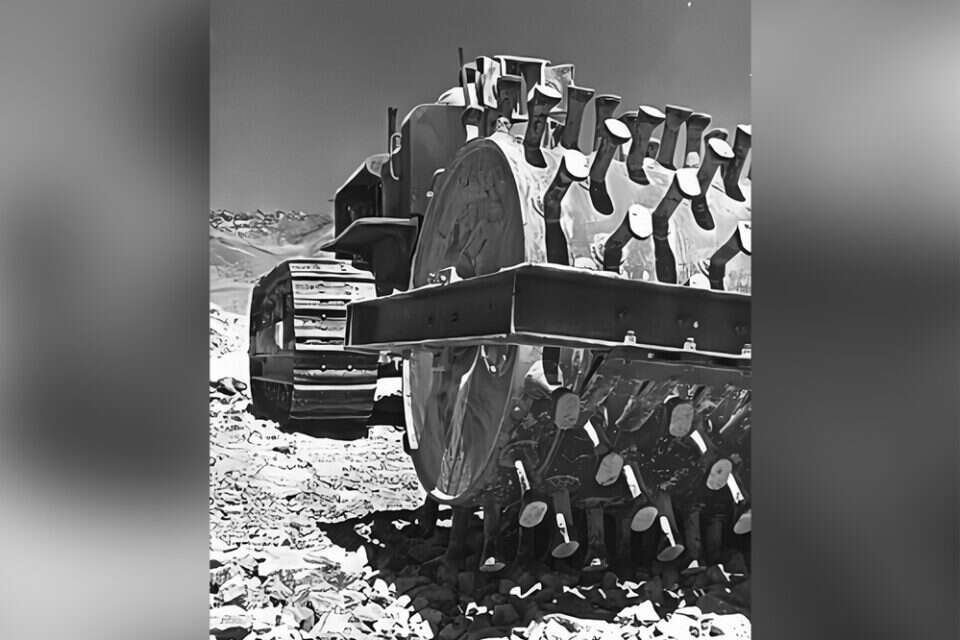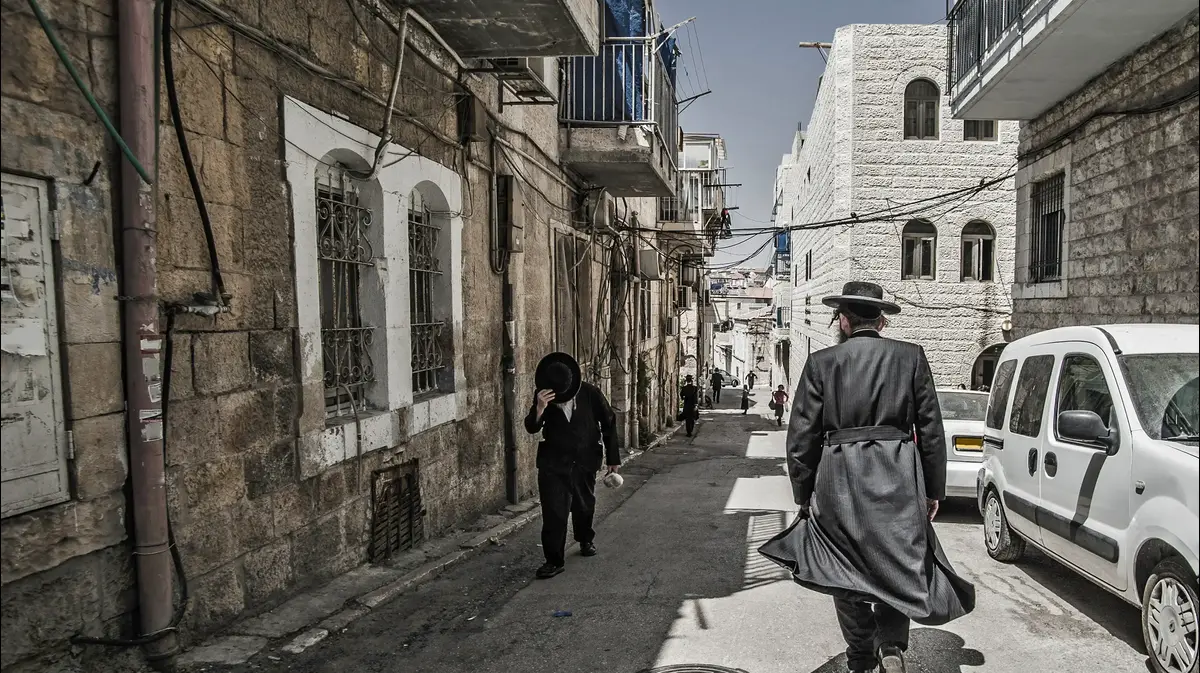"Solel Boneh" against the government
Did you think that the State of Israel was built through joint labor, with general agreement and without bumps in the road?
Think again.
Here: In the first quarter of 1952, a series of dramatic meetings were held between the management of Solel Boneh and the Minister of Finance, Eliezer Kaplan, during which the company complained about the government's attitude to infrastructure and construction work.
The company's heads claimed that many government jobs were reserved exclusively for the Public Works Department (MA), which operated from the Ministry of Labor, "instead of sharing Solel Boneh with part of the volume of jobs required."
In addition, Solel Boneh complained about the government's refusal to allocate foreign currency to it according to its needs.
It is stated, for illustration, that in mid-1951 the company's request to receive an allotment of foreign currency in addition to the one allotted to it at the beginning of the year was rejected, even though the foreign currency was required for the company to purchase necessary machinery, equipment and raw materials from abroad.
The heads of Solel Boneh explained that the equipment and materials were intended for large construction works that were to bring another 15 million pounds into the coffers.
At a press conference for economics and industry reporters, held in mid-January 1952, Minister Kaplan referred to what he called "the centrality of Solel Boneh in the Israeli economy."
Kaplan updated that "Solel Boneh's total turnover in 1951 was 60 million Israeli pounds" - a huge sum in those days.
For comparison, the total state budget for that year was 208 million lire, not including the defense budget, which was in the possession of a military secret.
At that time, Solel Boneh employed more than 50,000 workers, who constituted about 11 percent of the labor force in the entire State of Israel.
At the beginning of 1952, the company controlled a number of key plants in the country: "Stone and Lime Industries", the Nesher Cement Factory, as well as "Koor Industries", "Phenicia" for glass production and "Herut" for plumbing products, in addition to controlling work at Haifa Port .
To secure its future, the company demanded that the government enter into a partnership with it and hold 50 percent of its shares.
After discussions, it was reported that "the government rejects the proposal, but is willing to consider a partnership with Solel Boneh in the establishment of new industrial plants" - as did in practice in subsequent years.
Theater and orchestras: Cultural momentum in Haifa
Haifa Municipal Theater in Photography from the 1960s, Photography: According to Section 27A of the Copyright Law
At a meeting of the Haifa City Council, held on January 18, 1952, the mayor, Abba Hushi, expressed his concern about the minority of cultural institutions operating within the city.
"Hapoel also needs a culture (culture) without which he may enter a routine (boredom) and boredom life, which will also impair his productivity," Hushi explained the dismal situation, for him.
I have a desire for an official repertory theater that will operate within Haifa, in addition to the amateur theater that operated under the leadership of the city's resident, Joel Kev and Naki, a graduate of the Government Theater Institute in Warsaw, Poland, who defined himself as "crazy to talk."
Hushi, who wanted to shorten the process of establishing the municipal theater as much as possible, at one point invited the Tel Aviv Chamber Theater to establish its headquarters in Haifa.
The refusal of the Cameri did not weaken Abba Hushi's hands, and in early 1952 the mayor announced that "just as Haifa is a leader in the whole country in the field of industry, so it will be a leader in the field of culture, and a university worthy of academia will be there."
This did not end Hushi's efforts to position Haifa as a city of high culture for the masses.
In 1952 he founded a municipal youth orchestra, explaining that "a city without a wind orchestra cannot call itself a city."
The initiative turned out to be a great success, and a few years after its establishment, the Haifa Youth Orchestra was considered the best of its kind in the country, and at its peak numbered about 700 young musicians.
Less than a decade later, in 1961, a spacious cultural complex was inaugurated in the city's Hadar neighborhood, which included a magnificent municipal theater, a large municipal library, a study hall, a nightclub ("theater club") and a huge hall for hosting lectures and rehearsals of municipal orchestras.
Two years later, another vision of Abba Hushi was realized, when in 1963 the "University of Haifa Institute" (later, the University of Haifa) was opened in the city, which was established under the auspices of the Hebrew University of Jerusalem.
What scared the ice cream makers?
Popsicle Advertising Poster in the 1950s, Photo: Design: Roly, Shenkar Institute for Design Documentation
On January 20, 1952, dozens of ice cream, popsicle and ice cream makers gathered in Tel Aviv.
"A big problem has fallen on the development of our house," reported the union's chairman, Dov Ben-Zvi. Of Eskimo glaciers. "
At that time, there were 32 registered manufacturers in the country under the Ice Cream and Eskimo Association (section), all of which were small in scope.
During 1953, with the start of Popsicle operations, more than 20 of them closed their businesses, while eight other manufacturers merged into a factory established in Petah Tikva called Popsicle, which tried to compete with Popsicle, but without success.
By the mid-1950s, "Artik" had taken over about 80 percent of the ice cream market in the country and employed 600 workers.
During the winter months, the company began producing a European product in the shape of a biscuit with a chocolate dome and a cream filling, and gave it its Hebrew name: crembo.
The Popsicle plant closed in 1972 after accumulating large financial debts.
The production machines were sold, and the names of the various brands (Popsicle, Sancor, Lux and more) were scattered among several manufacturers.
Only the crembo continued to make a force, and Israel has for years been considered the world champion in the field of cremboes.
In the winter of 2018, for example, 50 million units of candy were consumed in the country.
Immigration to Israel was stopped by air
An immigrant plane lands in Lod, 1950s, Photo: Wikipedia
A statement from the Jewish Agency's Aliyah Division, issued on January 17, 1952, stated that "a ruling on bringing immigrants to Israel by plane, and there is currently no chance of a new one, unless the agency has the financial means to do so."
Until 1951, more than 200,000 immigrants arrived in Israel by plane.
In December 1951 and January 1952, 1,200 immigrants were scheduled to arrive in Israel each month on Near East Airlines (which operated most of the flights from Yemen, Iraq, Iran and India), but the flight was canceled at the last minute due to lack of budget.
The Jewish Agency's Aliyah Division stated that "the cessation of aliyah by air is only a temporary matter, until the funds required for its renewal are received."
He was electrocuted and died twice
The death of the worker of the Jerusalem Electric Company, the late Mordechai Menda (47), who was electrocuted to death on January 14, 1952, remains a mystery.
Manda fell to the ground with his electric shock, and Magen David Adom members who were called to the scene managed to revive him, after a quarter of an hour of efforts.
Unfortunately, however, six hours later, while sitting in his chair and resting in the IEC offices, he suddenly fell and died - this time without any possibility of bringing him back to life.
Rising prices in the black market
The prices of products on the black market on Lilienblum Street in Tel Aviv suddenly rose in mid-January - something that angered many customers.
One of them claimed to a black market trader: "I used to buy a pack of chocolate for 350 pennies, and now you suddenly demand 500 pennies. And why?"
The trader explained that until recently only inspectors visited the market, "and we knew how to get along with them. But recently raids by police began, and here the business suddenly became really dangerous. Therefore we have to cover ourselves with extra risk on each product."
The missing / gifts that were
Shell pods
Photo: From the archive of the Nostalgia Online website,
A gift that was prevalent in Israel in the distant days, when soldiers used to bring empty backpacks of various types of armament with them when they returned home from military service.
Make an ashtray for cigarettes or a decorative vase for dry sprigs - a fashionable and common decoration in those days.
Shell pods were also given as farewell gifts to a discharged soldier or a permanent man.
Engraving words were engraved on the body of the backpack, next to the unit's emblem.
The backpack was then thoroughly polished, until it became shiny and shiny, and thus could be proudly displayed in the living room of the house.
The grocery store / items since
Telephoto camera
Photo: From the archive of the Nostalgia Online website,
The "Agpamatic" camera made by Agfa, also known as "Telpoket", took the world market by storm, and from the second half of the 1970s was also successfully sold in Israel.
The big innovation in the camera was the zoom, which like it could only be found in professional cameras until then.
On top of that, the awkward flash cube was replaced with a flat plate that contained eight flash lamps.
All of these, along with its functional size and light weight, made the "Telepoct" a hit.
From Israel to the world: cars, whiskey and refrigerators
Photo: From "The Encyclopedia of Israel in Pictures", 1952,
In mid-January 1952, the Ministry of Trade and Industry published a list of the main products exported from the country for the first time in 1951.
Among the excellent products: "Amcor" refrigerators for Turkey;
Dentures for Poland and Romania;
Goose feathers for Italy;
Scotch whiskey made in the country to Belgium, Italy, England and the USA;
pure olive oil made by "Shemen" for New Zealand, West India and Colombia; Clothespins made by "Hadak" from Kfar Blum in America; "Pelegin" pills for headache for Bulgaria; "Fraser" (pictured above), exported to Sweden, Finland and France
Ads that were
Do you have pictures or souvenirs from the first days of the country? Write to us: Yor@ShimurIsrael.Org
Were we wrong?
Fixed!
If you found an error in the article, we'll be happy for you to share it with us











/cloudfront-eu-central-1.images.arcpublishing.com/prisa/KMEYMJKESBAZBE4MRBAM4TGHIQ.jpg)


/cloudfront-eu-central-1.images.arcpublishing.com/prisa/EXJQILQR5QI7OMVRTERD7AEZAU.jpg)
